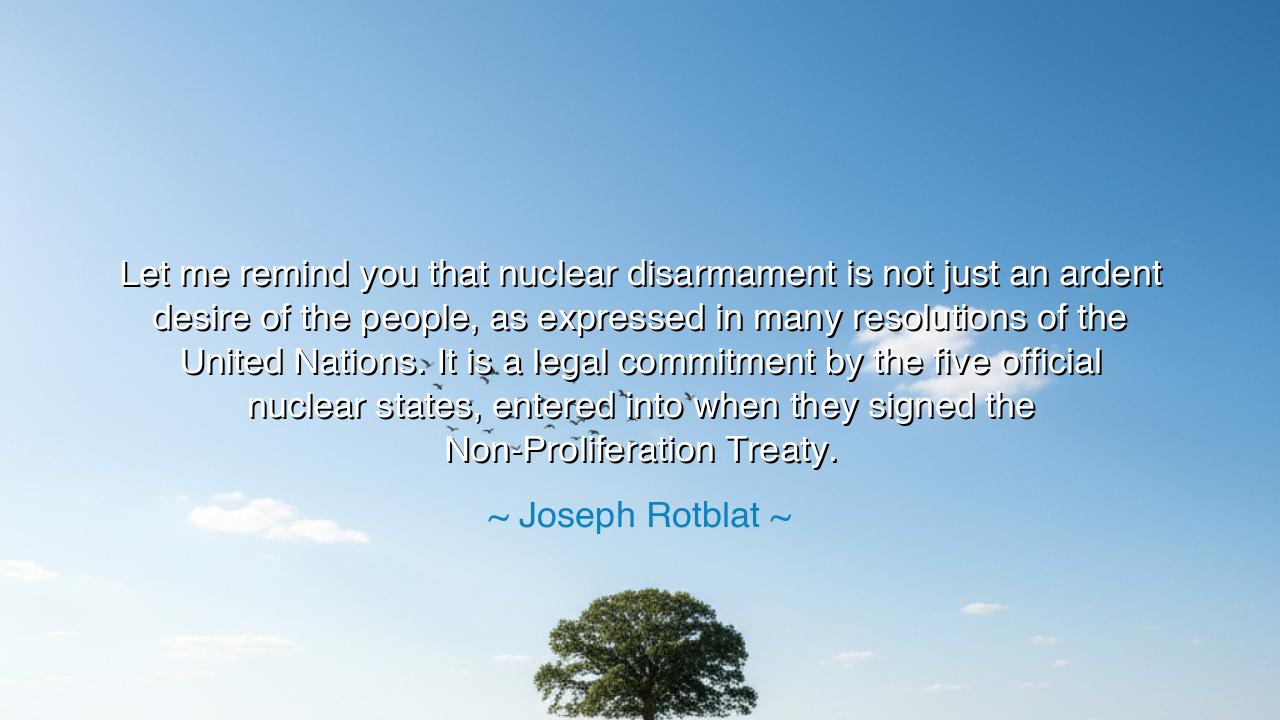
Let me remind you that nuclear disarmament is not just an ardent
Let me remind you that nuclear disarmament is not just an ardent desire of the people, as expressed in many resolutions of the United Nations. It is a legal commitment by the five official nuclear states, entered into when they signed the Non-Proliferation Treaty.






When Joseph Rotblat spoke these words — “Let me remind you that nuclear disarmament is not just an ardent desire of the people, as expressed in many resolutions of the United Nations. It is a legal commitment by the five official nuclear states, entered into when they signed the Non-Proliferation Treaty.” — he was not merely stating a political truth; he was summoning the conscience of humanity. His words rise like a solemn bell through the halls of time, calling the powerful to remember their promises, and the world to remember its duty. In his voice echoes both the sorrow of the scientist who saw the dawn of atomic fire and the hope of the man who believed that even the most destructive of powers could be restrained by law and morality.
Born from the ashes of Hiroshima and Nagasaki, the Non-Proliferation Treaty (NPT) was humanity’s attempt to reclaim its soul after glimpsing its own annihilation. The five official nuclear powers — the United States, the Soviet Union, the United Kingdom, France, and China — bound themselves to the world with solemn words: to move toward nuclear disarmament, to prevent the spread of these weapons, and to use the atom for peace, not war. Rotblat, himself once part of the atomic project, had walked away from that terrible power. He knew that to hold such fire was to hold the fate of the world. His reminder was not merely diplomatic; it was prophetic — that law must not be an ornament of words, but a covenant of survival.
In ancient times, kings and generals would swear oaths before the gods before they went to war. Breaking an oath was a curse upon their bloodline, a mark of eternal dishonor. Rotblat saw the NPT as such an oath — an oath between nations, sworn not to gods, but to future generations. Yet as years passed, the world grew forgetful. The arsenals of the powerful expanded; the promises of peace faded beneath the noise of politics. His words — “It is a legal commitment” — were a rebuke wrapped in wisdom. He reminded them that honor does not lie in strength of arms, but in the keeping of one’s word.
Think of Rotblat’s own story, for it shines like a beacon in this dark age. During World War II, he worked on the Manhattan Project, believing that Nazi Germany sought the bomb. But when he learned they did not, he left — the only scientist to walk away from that sacred, terrible task. His conscience could not bear the thought of unleashing such ruin upon humanity. He spent the rest of his life calling for disarmament, for he knew that the legal commitment of nations meant nothing if not matched by the moral commitment of the human heart. His life was a testament to what it means to place principle above power.
Rotblat’s tone carries both disappointment and dignity. He saw how easily leaders invoked the name of peace while building instruments of war. He understood that treaties without trust are hollow, like temples without priests. To him, the Non-Proliferation Treaty was not a political maneuver but a sacred document — a vow before all mankind that the fire once unleashed would be tamed. His words remind us that treaties, like oaths, are not mere parchment, but moral compasses — meant to guide nations away from destruction and toward a shared destiny.
There is an ancient saying: “He who holds the thunder must also hold wisdom.” Yet the world has too often worshiped thunder and forgotten wisdom. Rotblat’s call was for the awakening of conscience — for leaders to see that nuclear disarmament is not a favor to the world, but a duty to life itself. He spoke for the generations yet unborn, who cannot vote or sign treaties but will inherit whatever remains of this earth. His reminder that disarmament is a legal obligation is, at its heart, a reminder that morality and law must walk hand in hand, or both will fall into ruin.
The lesson of this quote is as clear as the light of dawn after the long night of fear: promises made in the name of humanity must be kept. The power to destroy cannot be justified by fear, nor delayed by pride. Let every nation, and every individual, remember that peace is not merely an aspiration — it is a responsibility, a commitment, a duty sealed by both conscience and covenant.
So let us live by the wisdom of Rotblat: honor the treaties, uphold your word, and let your strength be tempered by compassion. For a world that forgets its moral and legal obligations is a world that prepares its own grave. And a world that remembers them — that binds law to conscience — is a world worthy of survival.






AAdministratorAdministrator
Welcome, honored guests. Please leave a comment, we will respond soon